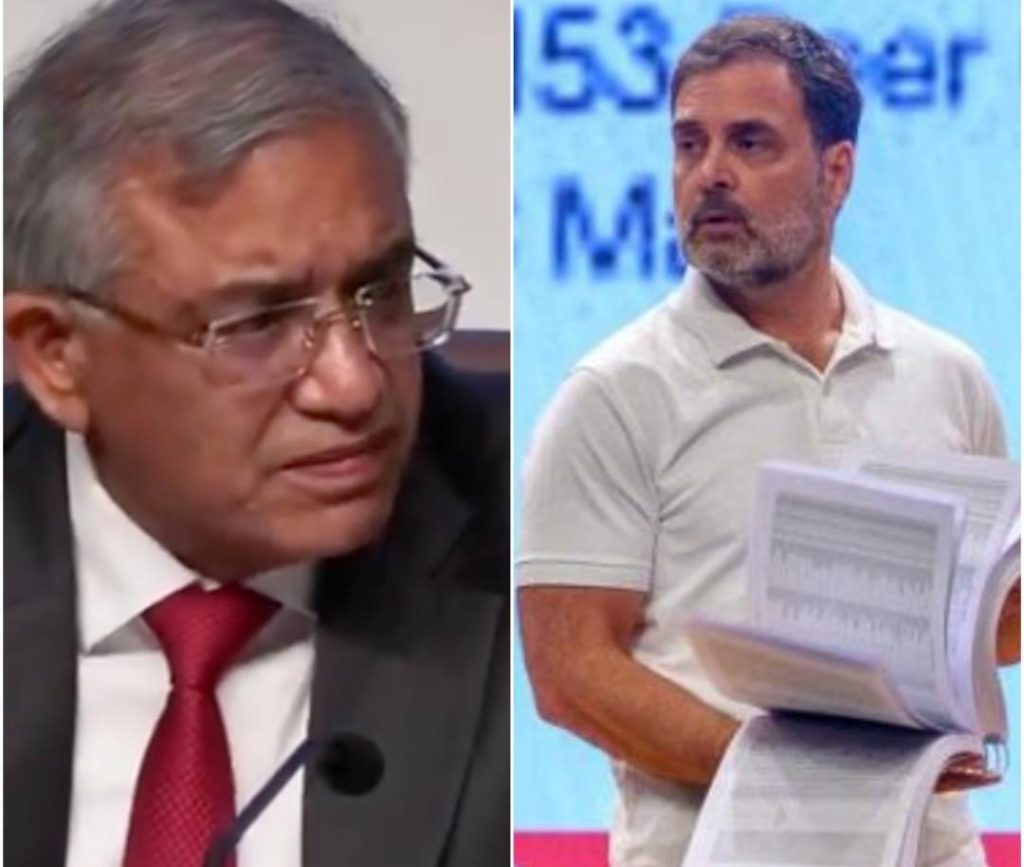
Vote Chori’ Phrase an Insult; Should We Share CCTV Footage of Mothers & Sisters Voting?: EC
In the midst of the ongoing political campaigns, the Election Commission of India (EC) has come down heavily on Congress leader Rahul Gandhi for using the phrase “vote chori” (vote theft) to claim that elections are rigged. Chief Election Commissioner (CEC) Gyanesh Kumar has termed the term an insult to the Constitution and has raised concerns over the privacy of voters.
The controversy began when Rahul Gandhi, during a rally in Gujarat, alleged that the BJP was indulging in “vote chori” and that the EC was not taking adequate measures to prevent it. This sparked a heated debate, with the EC intervening to condemn the phrase.
In a recent statement, CEC Gyanesh Kumar criticized the usage of the phrase, saying, “It is an insult to the Constitution and the democratic process. We will not tolerate such language.” He emphasized that the EC takes the responsibility of conducting free and fair elections very seriously and that any allegations of vote rigging are thoroughly investigated.
However, the EC has also been faced with demands from some quarters to release surveillance footage from polling booths to prove that the elections are free from any manipulation. In response to these demands, CEC Gyanesh Kumar posed a rhetorical question, “Should the Election Commission share the CCTV videos of any voter, including their mothers, daughters-in-law?”
The EC’s concern is centered around the privacy of voters, particularly women. Sharing CCTV footage of voters, including those from vulnerable sections of society such as mothers and sisters, could be potentially harmful and intrusive. The EC is duty-bound to protect the privacy of voters and ensure that their personal data is not leaked or misused.
The demand for releasing CCTV footage is not new. In the past, there have been instances where political parties have demanded to see the footage to “expose” alleged vote rigging. However, the EC has consistently maintained that sharing such footage could compromise the integrity of the electoral process and potentially harm the reputation of innocent voters.
In an era where social media is replete with misinformation and fake news, the EC’s concerns about privacy are well-founded. The misuse of personal data can have far-reaching consequences, including identity theft, harassment, and even physical harm.
Moreover, the demand for releasing CCTV footage is often driven by political motives rather than a genuine interest in ensuring the integrity of the electoral process. Political parties often use such footage to discredit their opponents and create a narrative that they are more committed to ensuring free and fair elections.
The EC’s stance on this issue is consistent with its commitment to protecting the privacy of voters. In 2019, the EC had introduced a new set of guidelines for the use of social media during elections, which included provisions for ensuring the privacy and security of voters’ personal data.
In conclusion, the EC’s criticism of the “vote chori” phrase is well-deserved. The use of such language is not only insulting to the Constitution but also undermines the democratic process. Furthermore, the EC’s concerns about sharing CCTV footage of voters, including their mothers and sisters, are well-founded and necessary to protect the privacy of voters.
It is essential for political parties and individuals to refrain from making inflammatory statements that can undermine the integrity of the electoral process. Instead, they should focus on engaging in constructive debates and promoting voter awareness and education.
The EC’s commitment to protecting the privacy of voters is a crucial step towards ensuring the integrity of the electoral process. As the country heads towards the next general elections, it is essential that political parties and individuals respect the EC’s role and responsibilities and refrain from making demands that could compromise the privacy of voters.






